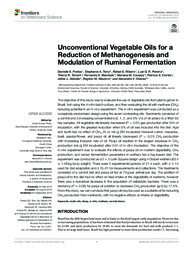Unconventional vegetable oils for a reduction of methanogenesis and modulation of ruminal fermentation.
Unconventional vegetable oils for a reduction of methanogenesis and modulation of ruminal fermentation.
Author(s): FREITAS, D. S.; TERRY, S. A.; RIBEIRO, R. S.; PEREIRA, L. G. R.; TOMICH, T. R.; MACHADO, F. S.; CAMPOS, M. M.; CORRÊA, P. S.; ABDALLA, A. L.; MAURÍCIO, R. M.; CHAVES, A. V.
Summary: The objective of this study was to evaluate the use of vegetable oils from plants grown in Brazil, first using the in vitro batch culture, and then evaluating the oil with methane (CH4) reducing potential in an in vivo experiment. The in vitro experiment was conducted as a completely randomized design using the seven contrasting oils. Treatments consisted of a control and 3 increasing concentrations (0, 1, 2, and 5% v/v) of oil added to a tifton 85 hay samples. All vegetable oils linearly decreased (P < 0.01) gas production after 24 h of incubation, with the greatest reduction when 5% of oil was included into the diet. Açaí and buriti had no effect of CH4 (% or mL/g DM incubated) however carrot, macaúba, basil, passionflower, and pequi oil all linearly decreased (P < 0.01) CH4 production with increasing inclusion rate of oil. Pequi oil resulted in the largest decrease in CH4 production (mL/g DM incubated) after 24 h of in vitro incubation. The objective of the in vivo experiment was to evaluate the effects of pequi oil on nutrient digestibility, CH4 production, and rumen fermentation parameters in wethers fed a hay-based diet. The experiment was conducted as a 2 × 2 Latin Square design using 4 Dorper wethers (63.4 ± 1.46 kg body weight). There were 2 experimental periods of 21 d each, with d 1?14 used for diet adaptation and d 15?21 for measurements and collections. The treatments consisted of a control diet and pequi oil fed at 70 g per animal per day. The addition of pequi oil to the diet had no effect on feed intake or the digestibility of nutrients, however there was a numerical decrease in the population of cellulolytic bacteria. There was a tendency (P = 0.06) for pequi oil addition to decrease CH4 production (g/d) by 17.5%. From this study, we can conclude that pequi oil may be used as a suitable oil for reducing CH4 production from ruminants, with no negative effects on intake or digestibility.
Publication year: 2018
Types of publication: Journal article
Unit: Embrapa Dairy Cattle
Keywords: Cerrado biome, Exotic oils, In vitro, Methane, Sheep
Observation
Some of Embrapa's publications are published as ePub files. To read them, use or download one of the following free software options to your computer or mobile device. Android: Google Play Books; IOS: iBooks; Windows and Linux: Calibre.
Access other publications
Access the Agricultural Research Database (BDPA) to consult Embrapa's full library collection and records.
Visit Embrapa Bookstore to purchase books and other publications sold by Embrapa.

